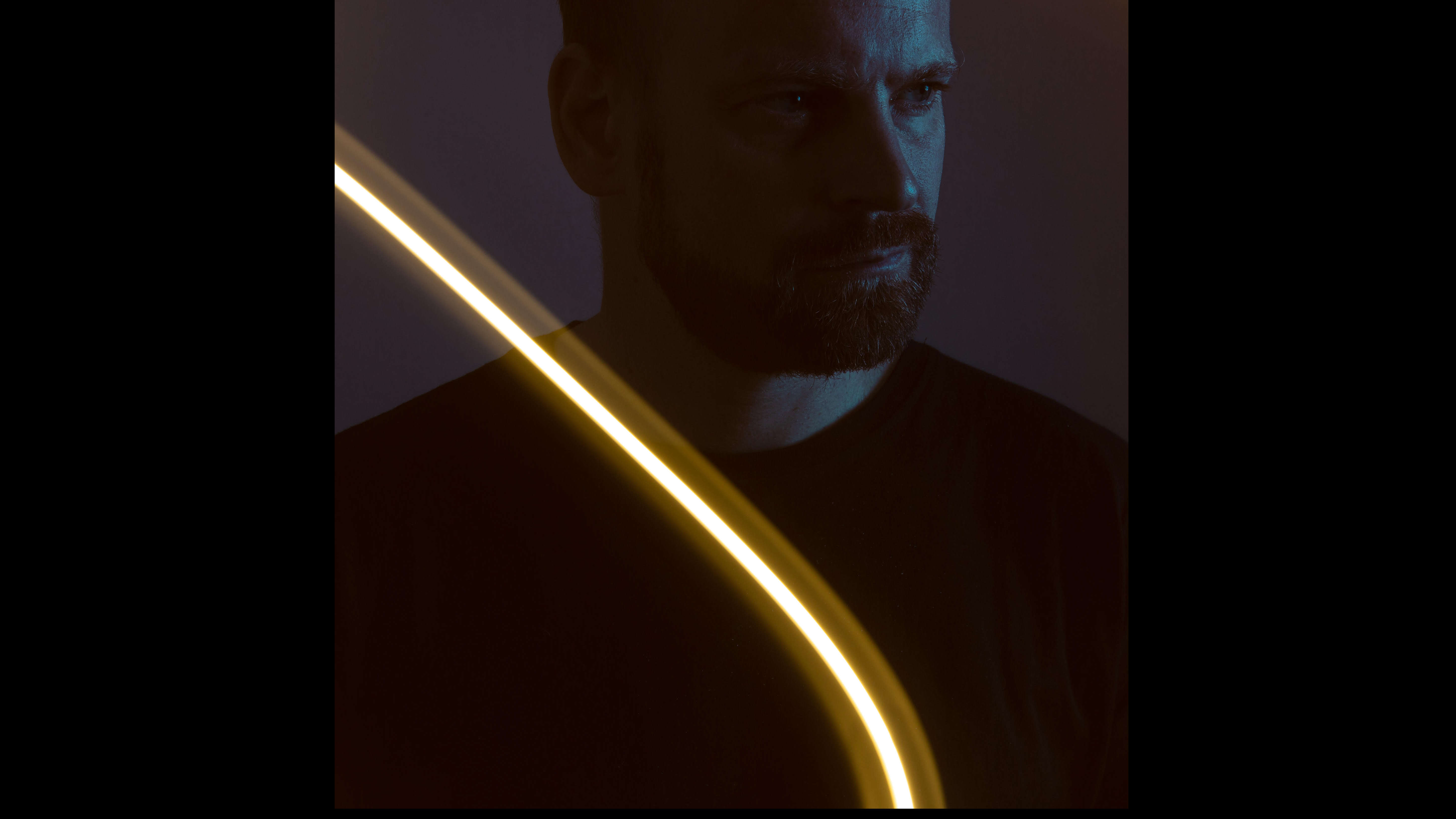
“We've detached ourselves from just writing about rocks,” laughs Robin Staps as he explains the lyrical concept of his latest album, Phanerozoic II: Mesozoic & Cenozoic. The second part of The Ocean's eon-spanning double album tackles the past 250 millions of Earth's history over eight tracks that display all the German band's expansive hallmarks that complement the crushing weight and pressure of time.
But rather than songs about dinosaurs, asteroids and tectonic plates, the guitarist and chief songwriter uses the grand themes of the band's albums to express more relatable, affecting ideas.
“What we have done with the last couple of records that have an un-human backbone, is approach the lyrical side from this meta level. The singer's lyrics have to have a relevance to human emotions and with Phanerozoic the basic idea is eternal recurrence. It's the idea that everything happens over and over again an infinite amount of times in infinite time and space. Time is cyclical rather than linear, things repeat,” Robin explains, revealing that the history of this idea that can be traced from Friedrich Nietzsche back to old Hindi and ancient Egyptian writings.
“Of course there are references to the era or period within the Phanerozoic that each respective song is talking about,” he continues, “but also woven into it is this fabric is a lot of personal, deja vu experiences in our lives where we realise we've been at this point before, or you haven't learned from your mistakes. All these cyclical experiences of your life are woven into the larger concept of the cyclical experience of time.”
The band are no strangers to the conceptual approach, with albums based around geological eras, a metaphorical descent through the pelagic depths of the ocean, or using the evolution of astronomy to critique of religion.
“It's always a compromise, juggling the musical coherence that you have on hand and then trying to make the whole things make sense conceptually"
While The Ocean always write the music before Robin tackles the lyrics (except for 2013's aquatic-inspired Pelagial) pairing the thematic approach with the band's towering sonic tapestries is a process Robin admits to finding difficult. However, it's a challenge he enjoys, with the effect that the concept helps ground the vastness of music, a reason The Ocean has become one of the most interesting and acclaimed bands in the realm of progressive and pos-metal realms.

“It's always a compromise, juggling the musical coherence that you have on hand and then trying to make the whole things make sense conceptually. Every decision you take is always a decision at the expense of one of these two realms; either the perfect lyrical choice or the perfect conceptual choice, but very rarely this alliance,” Robin explains. “On one hand it can be a corset that restrains you, on the other it gives you a focus. I love to get immersed in certain themes and that makes it easier to write lyrics.”
Want all the hottest music and gear news, reviews, deals, features and more, direct to your inbox? Sign up here.
Reflecting on his creative process, it's not surprise to find that Robin is avid student of the half a century long history of musical concept records, with his eclectic top ten spanning narratives that include the elements, space, bad trips and an alien called Bluebird…
1. The Ventures – The Ventures In Space (1964)
"I particularly like this record because it has a lot of weird sounds and ethereal effects on it that are all made with guitars, not with synths"
“There are different kinds of concept alums, and some in this list I'm not sure would even be considered concept records. The Ventures In Space has a concept coming from the sound side of it. It was one of the first records where guitar effects were used and they defined this sound that was later called surf rock.
"They were really appreciated for developing this niche, unique style of music that was different to anything else that was around, instead of focussing on hit singles. I particularly like this record because it has a lot of weird sounds and ethereal effects on it that are all made with guitars, not with synths. It even says so on the cover that all sounds were made with real instruments.

“It has a time stamp, but in the case of surf music in general that time stamp works really well and it's charming, I can go back and enjoy it. I have a hard time with lot of records from the 80s or 90s, especially heavy records, because they are so outdated sound wise.
“With all The Ventures' records there's a theme, or a rough feeling instead of a developed narrative or thread like Pink Floyd's The Wall. But I like a lot of these records where the concept is only coming from the music – Brian Eno's Ambient 4: On Land is another example.”
2. The Mothers Of Invention – We're Only In It For The Money (1968)
"I think Frank Zappa was the true punk of that time before anyone came up with the idea of punk"
“The sheer genius of making an album cover that is such a pastiche of Sgt Pepper... and then naming it We're Only In It For The Money is just brilliant by itself.
"I think Frank Zappa was the true punk of that time before anyone came up with the idea of punk. But at the same time he hated the hippies, who had a monopoly on counter-culture.
"His albums are like a testimony of someone with strong anti-establishment feelings but at the same time someone who is disgusted with the contemporary anti-establishment movement. And besides all that he was just a funny motherfucker, I would loved to have met him.”
3. Dom – Edge Of Time (1972)
"You wouldn't expect where it ends when you listen to the first song, and that's what I really appreciate about it"
“It's a very niche, cult concept record about a bad trip. It's only four tracks, which starts with this very playful, major-dominated, happy music, and gets very dark towards the end.
"The album goes through these different phases seamlessly between the tracks. You wouldn't expect where it ends when you listen to the first song, and that's what I really appreciate about it. I think in a way that's true of our new record: when you listen to the first track you won't necessarily be able to guess where the journey takes you.
“It's a very dark record for 1972, it's done very well. It reminds me of another record by a Swiss band called Abraham, called Look, Here Comes The Dark! that I released on Pelagic Records two years ago.
"It has a post-apocalyptic theme about the time after humanity, from plants taking over and then there being nothing on Earth, just this piece of rock floating in space. It relates to the Dom record: it's a more contemporary take on what they did almost 50 year ago. It takes the bad trip idea further. Listen to the records back-to-back and I think you will see the similarities.”
4. Nektar - Remember The Future (1973)
"There's a Bluebird who visits Earth but is always scared away by the inhabitants, except for this young blind boy"
“It's a really solid record that I enjoy listening to. But I think the story is really cool too. There's a Bluebird who visits Earth but is always scared away by the inhabitants, except for this young blind boy.
"This Bluebird has come to Earth so much that he's seen different stages of evolution happen, and he explains it from this birds-eye perspective, which I think is a brilliant idea.
Then on the second side of the record I think Bluebird gives this boy eyes, and answers the boy's questions about what he has seen by visiting Earth over so many years.
“It's very psychedelic in a way. I don't see much of a link between the music and the lyrics, but it's just very nicely done. I like the spacious, lofty idea, and it's very cool. It's not as well known as it should be.”
5. Nine Inch Nails – The Downward Spiral (1994)
"I was intrigued by the darkness and ambiguity of it"
“I was a child of the 90s, so this may have been one of the first concept records I got into. I was intrigued by the darkness and ambiguity of it, because at first you can't tell that it's all connected tracks with a story that develops about a guy drifting deeper and deeper into his own abyss.
"There's lots of room for interpretation in each track. It was one of the those early records where I had the impression that someone had a holistic idea of an album in mind when they were writing it, not just isolated tracks. That sucked me in.
“I only saw them live for the first time a few years ago, even though they're one of these bands that have always been there since I first heard them.
"I also really got into the instrumental Ghosts I-IV album when I was writing Heliocentric (2010); I think it was the only album I was listening to when I was writing that album. Nobody noticed but there's a lot of influence on that album from Ghosts.”
6. Refused – The Shape of Punk to Come (1998)
“That band was pure conceptualism. The message of that record was basically that punk and hardcore music can't be revolutionary if it sounds mainstream. I grew up with this band after first seeing them in 1994 when they were just a new school hardcore bands repeating the conventions.
"Then they got bored of that and really started challenging the listeners, and the scene as a whole, by incorporating all these different elements from different musical directions – the jazzy bits, the techno bits – and also stylistically. All these kids were wearing baggy shorts and Youth Of Today t-shirts, and Refused came along and painted their nails black, died their hair black, wore black shirt and ties onstage, and everybody thought 'What the fuck are these kids doing?'
“They were just bored and upset with the status quo of the counter-culture, and they challenged that with plagiarism. Everything about that band was plagiarism! Refused Are Fuckin' Dead goes back to Born-Against; the cover goes back to this Rye Coalition record; the album title is from Ornette Coleman; and I think there's a sample from a [Igor] Stravinsky performance of The Rite Of Spring... there are so many references.
“And the manifesto that came with the original record was extremely over the top and pretentious. But I find all of that immensely charming. They were a band that wanted to challenge the boredom that surrounded them, and by doing so they created a record that was incredibly important for personally and showed what's possible. 'Demand the impossible' was one of the lyrics and it was their message.”
7. Neurosis – Times Of Grace / Tribes Of Neurot – Grace (1999)
"Driving home from the gig I thought ‘I want to play music, and I want to do something like this.’ They really shaped my path"
“Times Of Grace definitely stands on its own, you don’t need Grace to appreciate it. I’m not sure if it’s true vice versa, I’m just not that much into ambient music. But the idea that Grace is this ambient extension of Times Of Grace is brilliant.
"We tried playing both records at the same time when the record came out on CD players. You don’t even have to press play at exactly the right moment, the Grace record always just seems to be emulating the mood and spheres that Times Of Grace is moving into. It’s extremely well done, and I’m not sure if it had been done before.
“The Times Of Grace tour was when I first saw Neurosis live. I drove for three hours with my friend to see them in Berlin. It was bitterly cold and it was a really disturbing night. The whole evening was just doomed, it was not friendly.
"When Neurosis came on after this lengthy tribal percussion intro that lasted forever, people were just hitting each other over the head, not in a friendly bumping into each other pogo style, just pure violence. But it was a super immersive experience where they sucked you into their world and would not let you out until two hours later.
"There were visual projections, every song merged into the next track, never pausing to let go of you. Driving home from the gig I thought ‘I want to play music, and I want to do something like this.’ They really shaped my path.”
8. Dredg – El Cielo (2002)
“It’s a brilliant record musically, but it’s also a good concept album from every angle. It’s inspired by this weird painting [Dream Caused by the Flight of a Bee Around a Pomegranate a Second Before Awakening by Salvador Dali] with weird scenes in it, and every song is making reference to a different scene in the painting. For example there’s an elephant with really long legs, and so there are lyrics that deal with it.
“The album’s booklet is full of these excerpts from letters, which are making reference to the painting, and the lyrics are also making reference to the letters! So the songs aren’t always talking about the same thing, but always transcending it and putting into a different context. I think that’s really well done here. They merge it all with the music in a very perfect way.
“Apparently it’s all about sleep paralysis – one of the band members might have had that. And it makes a lot of sense, as [Dali’s] paintings always look like some kind of weird, sleepless night’s dream.”
9. Thrice – The Alchemy Index Vols I & II (2007) The Alchemy Index Vols III & IV (2008)
"It's not a detached concept; they wove the ideas into the music"
“They've stood the test of time. I go back and listen to those albums a lot because the songs are so brilliant. The concept isn't that ground-breaking but it's super well executed. Many bands have taken the four elements approach – before Thrice there was a band called Jane, who did Fire, Water, Earth & Air (1976), and Mastodon – but they do each part so well that it's instantly obvious.
"If you did a blind listening everyone would guess the right things. It's not a detached concept; they wove the ideas into the music. And it's a great collection of songs.
“Mastodon's Leviathan [2004] is a brilliant record too. The way they did these four albums (Remission, Blood Mountain and Crack The Skye) for each element as part of a larger concept is really cool. And Blood And Thunder is still the best Mastodon song, I still play that song in sound check sometimes.”
10. Meshuggah – Catch 33 (2005)
"It’s not like a lot of these prog records which are just showy and wanky, where you have to pay a lot of attention, you can just rock out and not need to understand"
“To be honest I don’t care at all about the lyrical concept of this record. What I love about it is that it’s one long piece of music divided into 13 tracks, but the divisions between the songs are completely arbitrary. I just admire it from a songwriting perspective.
"I was struggling when I wrote Palegial [2013] because the whole first half of the record is just one long track. And they’ve done something similar here, because it flows seamlessly from beginning to end without any pause. There are elements and themes that reoccurring much later in the record, which is something we’ve done with Phanerozoic II, for example.
“The whole record was also programmed, and I don’t think it would have been possible to even create something like that without programming. I can’t write songs without programming drums, before Paul [Seidel] learns them and changes them around. I think Meshuggah should have recorded the drums as it would have sounded better, but it does the job.
“What I love about this band is the immense rhythmical intricacies on one hand but this utter groove on the other. It takes a lot to figure what’s actually happening, and a lot of people will never get that far. But it doesn’t matter because every metalhead can just bang their head as it’s groovy and heavy.
"It’s not like a lot of these prog records which are just showy and wanky, where you have to pay a lot of attention, you can just rock out and not need to understand. That’s what’s so brilliant about them.”
The Ocean's Phanerozoic II: Mesozoic & Cenozoic is out 25 September on Metal Blade. To preorder visit metalblade.com/theocean
The Ocean tour Europe in January and February 2021: dates